Hillary Clinton
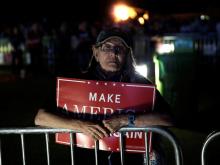
This semester I’m teaching a course called “Faith and Politics” at Emory University’s Candler School of Theology. It’s been a fascinating class for me, and I’m blessed to have very bright students who are required to volunteer for an actual political campaign and keep a journal of their experience.
Their final assignment is to write a paper proposing strategies for healing our divided nation. Our assumption is that all of the major faith traditions have important resources to bring to conflict transformation and reconciling opponents.
There are a few lessons from my class that might be useful for politicians and for the entire nation as we move toward the election.
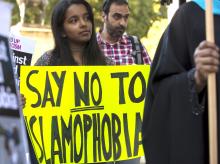
During the second U.S. presidential debate on Oct. 9, Donald Trump said, when asked about Islamophobia, that Muslims in the U.S. need to “report when they see something going on.”
“In San Bernardino, many people saw the bombs all over the apartment of the two people that killed 14 and wounded many, many people. Muslims have to report the problems when they see them.”
In response Muslims began to tweet using the hashtag #MuslimsReportStuff:
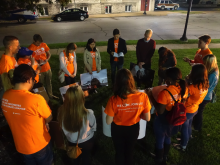
Grist’s Emma Merchant recently crunched the numbers on how frequently climate change has been discussed in the debates of the past five presidential election cycles (2000, 2004, 2008, 2012, and 2016).
She found that, out of 1,500 minutes of presidential and vice-presidential debate, climate change got a paltry 37 minutes of discussion. In 2012, of course, climate change got a whopping zero minutes of debate time.
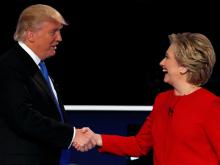
“The presidential nominees will share the dais with Timothy Cardinal Dolan, Archbishop of New York, and they will deliver the evening’s speeches in the spirit of collegiality and good-humor that has become a hallmark of the gala,” said a statement issued Sept. 27 by the New York Archdiocese and the foundation that runs the event.
The Oct. 20 dinner “honors a cause that transcends the polarizing political rhetoric of the day and exemplifies the vision of Gov. Alfred E. Smith, known as ‘The Happy Warrior,’ for his ability to maintain his positive outlook even as he tackled the pressing social issues of his day,” the statement said.
For Hillary Clinton, it was a classroom in Harvard with scared law school hopefuls trying to keep her from studying justice. For Malala Yousafzai it was a school bus loaded with an armed member of the Taliban, determined to keep her off her schoolyard soapbox. For me — clearly not saving the best for last here — it was a kitchen in the South with a confused freshman Baptist hell-bent on keeping me away from the pulpit.

Last night, Hillary Clinton made history as the first woman to accept the presidential nomination of a major party. She also answered the important question of why she has committed her life to public service
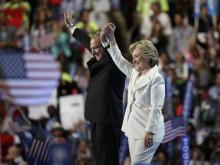
If there is one constant in this unconventional presidential campaign it is the unpredictability — and importance — of the Catholic vote.
Once a reliably Democratic cohort, Catholics have in recent decades swung back and forth between the two parties. And because they represent more than a fifth of all voters, and are concentrated in key Midwestern swing states, the candidate with the most Catholic support has wound up winning the popular vote.
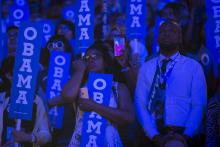
The Democratic National Convention kicked off Monday, and Hillary Clinton made history by officially being named the Democratic nominee for president. Sojourners Web and Multimedia Associate JP Keenan takes us behind the scenes and through the crowds as delegates across the country witness history.

It may not rank up there with Donald Trump’s “Two Corinthians” coinage or Hillary Clinton’s tortured email explanations, but a phrase that Tim Kaine used in an effort to yoke his Catholicism to the Methodist faith of his Democratic running mate deserves closer scrutiny.
“I’m a Catholic. Hillary is a Methodist,” Kaine said during a Florida rally on July 23 as Clinton introduced him as her vice presidential pick. “Her creed is the same as mine: Do all the good you can.”

True, Trump has finally rallied the crucial white evangelical Christian base of the GOP to his side. But he still has outspoken detractors among prominent Christian conservatives and he is viewed with ambivalence and even deep suspicion by many Jewish and Muslim voters and members of other minority faiths.

Presumptive Democratic presidential nominee Hillary Clinton announced Tim Kaine, the junior Democratic senator from Virginia and former governor of that state, as her vice presidential running mate Friday.
Kaine, a Roman Catholic, will appear with Clinton, a Methodist, at next week’s Democratic National Convention in Philadelphia.
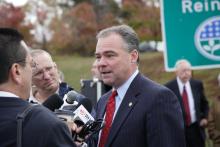
Generally thought of as less progressive than other potential VP nominees Elizabeth Warren and Julian Castro, Kaine could help Clinton attract white male voters, independents, and other moderates turned off by Donald Trump's rhetoric.

Sanders leaves what was a long and often-contentious race on a high note, having captured nearly 1,900 delegates — "far more," he said, "than almost anyone thought we could win.
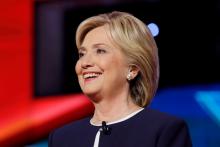
Although the FBI found no clear evidence that she intended to violate the law, FBI Director James Comey said Clinton and her staff were "extremely careless" in their handling of classified information.

White evangelical Christians, a crucial bloc of Republican voters, are backing likely GOP presidential nominee Donald Trump by a wide margin over Hillary Clinton but their support is significantly lower than for previous Republican candidates.
That relatively tepid faith-based endorsement could wind up undermining Trump’s chances for victory in November.

Republican Speaker of the House Paul Ryan, who last week gave his support to Trump, said Tuesday that Trump’s recent attack on Judge Gonzalo Curiel of a United States District Court was “the textbook definition of a racist comment.” Textbook racism, said Ryan — but he has yet to withdraw his support.

On the eve of her religious denomination’s quadrennial meeting, Hillary Clinton wrote a letter to Jewish agency heads saying she opposes the Boycott, Divestment, and Sanction movement targeting Israel, which the meeting will consider.
“I believe that BDS seeks to punish Israel and dictate how the Israelis and Palestinians should resolve the core issues of their conflict. This is not the path to peace,” Clinton wrote in a letter May 9 to David Sherman, chair of the Israel Action Network, and Susan K. Stern, vice chair of the Jewish Federations of North America.
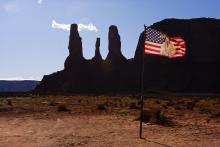
Unfortunately, the dialogue that is taking place this election cycle is not about broad-based equality or ending racism. The conversation we are having today is about the type of racism we want to settle for. Do we want Hillary Clinton to work to keep racism as our nation’s implicit bias, or allow Donald Trump to champion racism as our explicit bias? After all, isn't building a wall, banning Muslims, and personally funding a presidential campaign with a fortune made by buying and selling land that has been ethnically cleansed merely the fruit of a country that has learned all too well how to deal with the “merciless Indian savages” who sometimes get "off the reservation?"
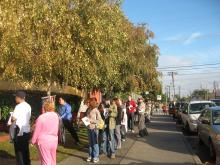
Hillary Clinton’s presidential campaign is joining with the Democratic Party to sue Arizona after the state’s fiasco of a primary election. Some voters in the primary waited up to five hours to vote.

On April 13, 36,000 Verizon workers walked off the job in the nation’s biggest strike since 2011, reports CNN Money. The strike is intended by to get Verizon to come back to the bargaining table since the striking workers haven’t had a contract since August.